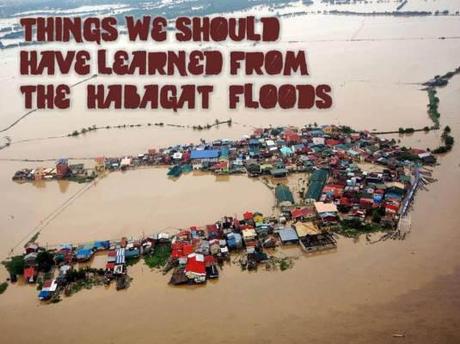
- Evacuate while the flooding is still manageable especially if your house is located near rivers and low-lying and areas vulnerable to flash floods. Do not demand a rescue only when it becomes too difficult already.
- Do not become among the people who would resort to panic-buying only when a disaster like this strikes. Store enough food and drinking water to last you and your family for at least five days. This includes supplies of medicine, first aid kits and personal hygiene.
- Fully recharge mobile phone (with load credits) and laptops (with Internet access) so that you can use them for communication with the outside world. Real-time updates are very important and helpful during these times. Have spare batteries if possible. You would never when power blackouts will occur.
- Have enough candles, flashlights and rechargeable lamps to light up the dark nights during power blackouts. It is extremely difficult to find your way in the dark lighted by just your cellphone LEDs.
- Two-storey houses and higher are now advisable when constructing a house. It seems the floods are getting higher and higher, and places which never experienced flooding before are no longer safe from getting submerged in water.
- The government should implement better and larger garbage disposal projects other than just prohibiting the use of plastic bags, waste segregation, and recycling. People continue to litter in the streets their cigarette buds, candy wrappers, bus tickets, water bottles, etc.
- The government should start implementing a nationwide urban planning and reconstruction to restore natural water paths that were covered up not only by illegal settlers but also by malls, subdivisions, condos and other business establishments. We should be lobbying our government to provide permanent and long-lasting solutions.
- Do not equate disasters or any tragedy, whether man-made or natural, with the wrath of God. Religion should not teach us that God only favors those that seem to side with our religious leaders and punishes the liberal-minded groups who sides with what seems more logical.
- Politicians and celebrities are taking the opportunity to get noticed by the public as seen by unnecessary TV guestings and media exposure, their Epal faces and names stamped in relief bags, and “being seen with the President” while distributing relief goods.
- Rescue and safety of the people should come first and foremost and not the call for donations or volunteers to pack and distribute relief goods. It should be a step-by-step procedure. Save the lives of the people first before treating their hunger. We should also take note that the government should have enough funds to address emergencies like these so the people should instead prioritize saving lives.
- People, especially the kids, should not be playing or swimming in the flooded streets, and worst, shirtless or half-naked. Exposure to diseases like leptospirosis should not be taken for granted. It is alright to have fun but not to the expense of your health and safety.
- The government still has not enough disaster-prevention, and disaster-control, machineries in place. Still after the 2009 Ondoy, almost everyone were still caught by surprise by the monsoon we know only now as “Habagat”. There should be enough national and local budget that could be used to attend to these needs. But where are they? Thus the call for the Freedom of Information bill grows stronger.
- People are jacking up prices of commodities and services. Some stores, groceries and market vendors have increased their prices on their products and goods, PNoy has mentioned that a certain pharmaceutical company has increased it prices on medicines, and PUVs (taxi, jeepney, pedicab, etc.) are asking for larger than normal fees to transport their passengers.
- Though there were plenty of honorable volunteers and heroes during the “Habagat” flooding, there still exists some bad elements of society who resorted to looting evacuated houses and business establishments.
- Some people have abused their influence, power or authority to make use of government properties and services. There were reports of the use of these resources for personal safety and convenience such as the case of a person who used DPWH equipment to siphon water out of their his house.
- Some of the “kalakal” boys have also took advantage of the situation to gather, and take possession, of all things useful and “valuable” that were drifted by the floods. No sense of worrying about looking for the victims or rightful owners. Finders keepers is their motto.
- We should be investing on amphibious vehicles rather than traditional or luxury cars. If not possible, invest on higher parking spaces conveniently located in the second or higher floors of the house or building. The rains and eventual floods in the Philippines have truly grown unpredictable and out of control.
- Twitter and Facebook, among other social media network sites, are very useful and informative during times of crisis. Information and Communication Technology is no longer a luxury but a necessity if we want to be constantly communicated and well-informed in real-time.
- People are becoming more creative and speedy in creating works of art in their call for donations and volunteers. Many attractive and eye-catching posters or banners have been immediately created and uploaded online asking for help and assistance from the kind-hearted and willing.
- People are extra helpful and generous with their time, effort and financial resources during calamities such as this. I sure wish its not only during floods, earthquakes, accidents, etc where everyone contributes. Everyone should start pitching in the same resources in trying to find pro-active solutions.

